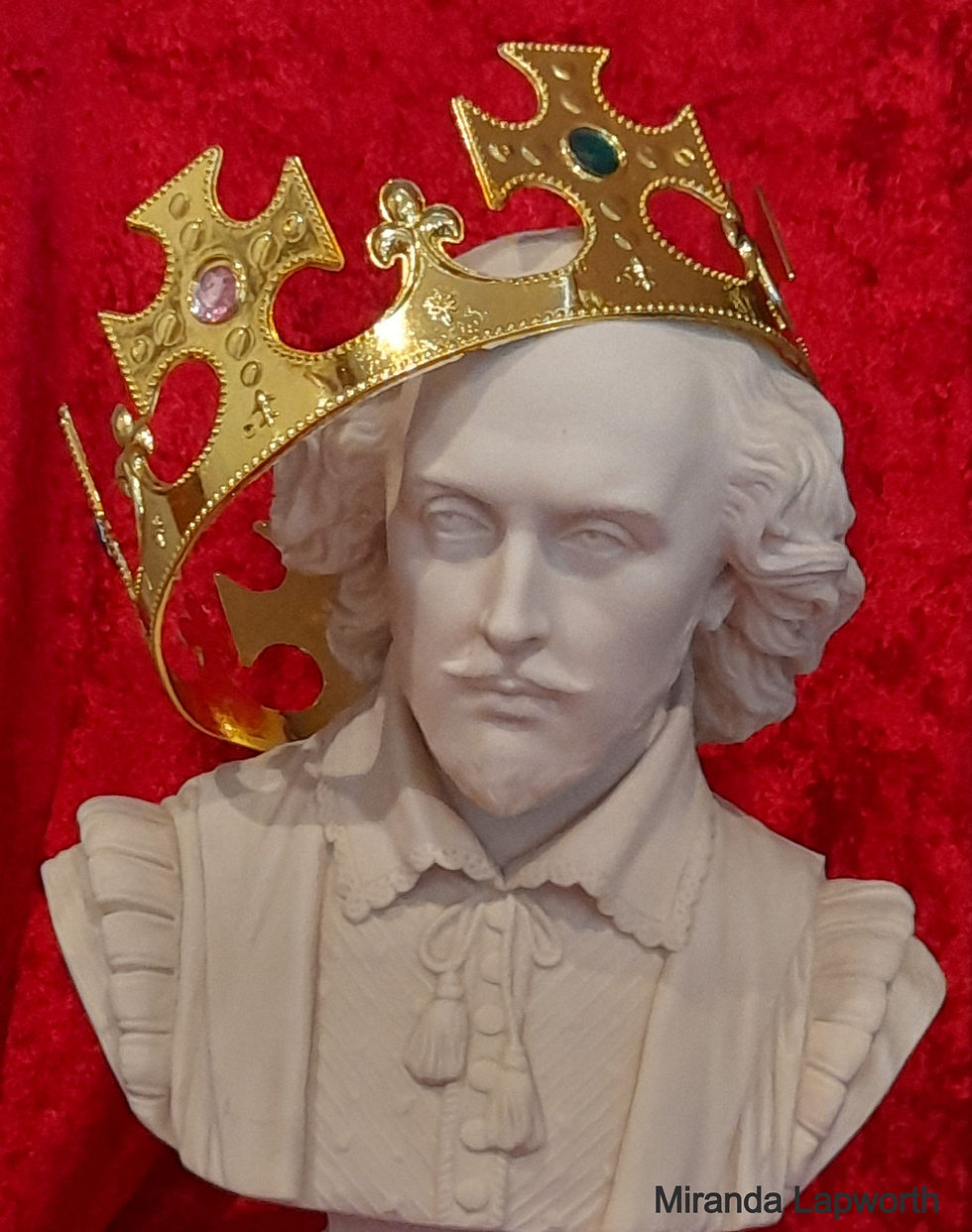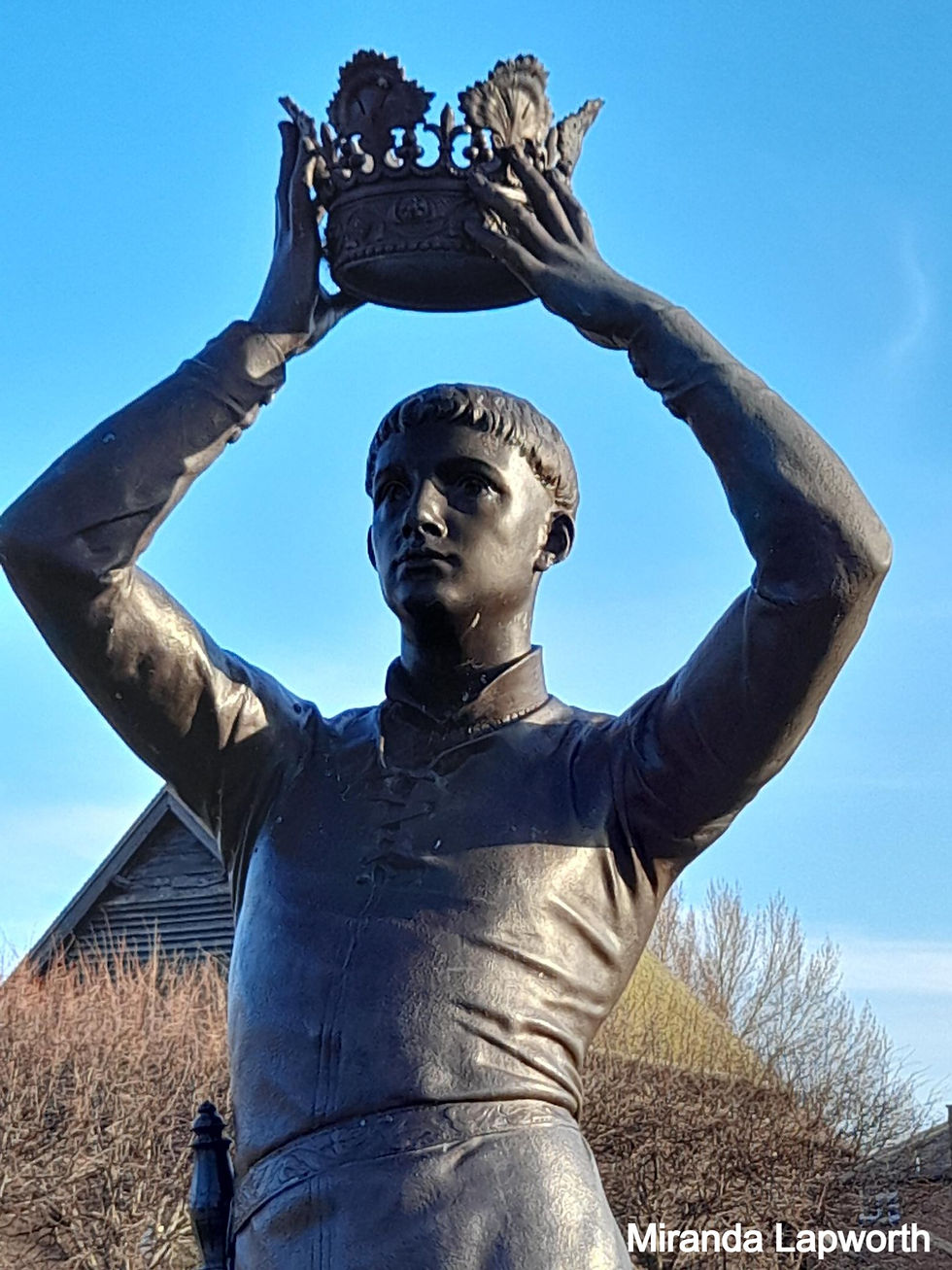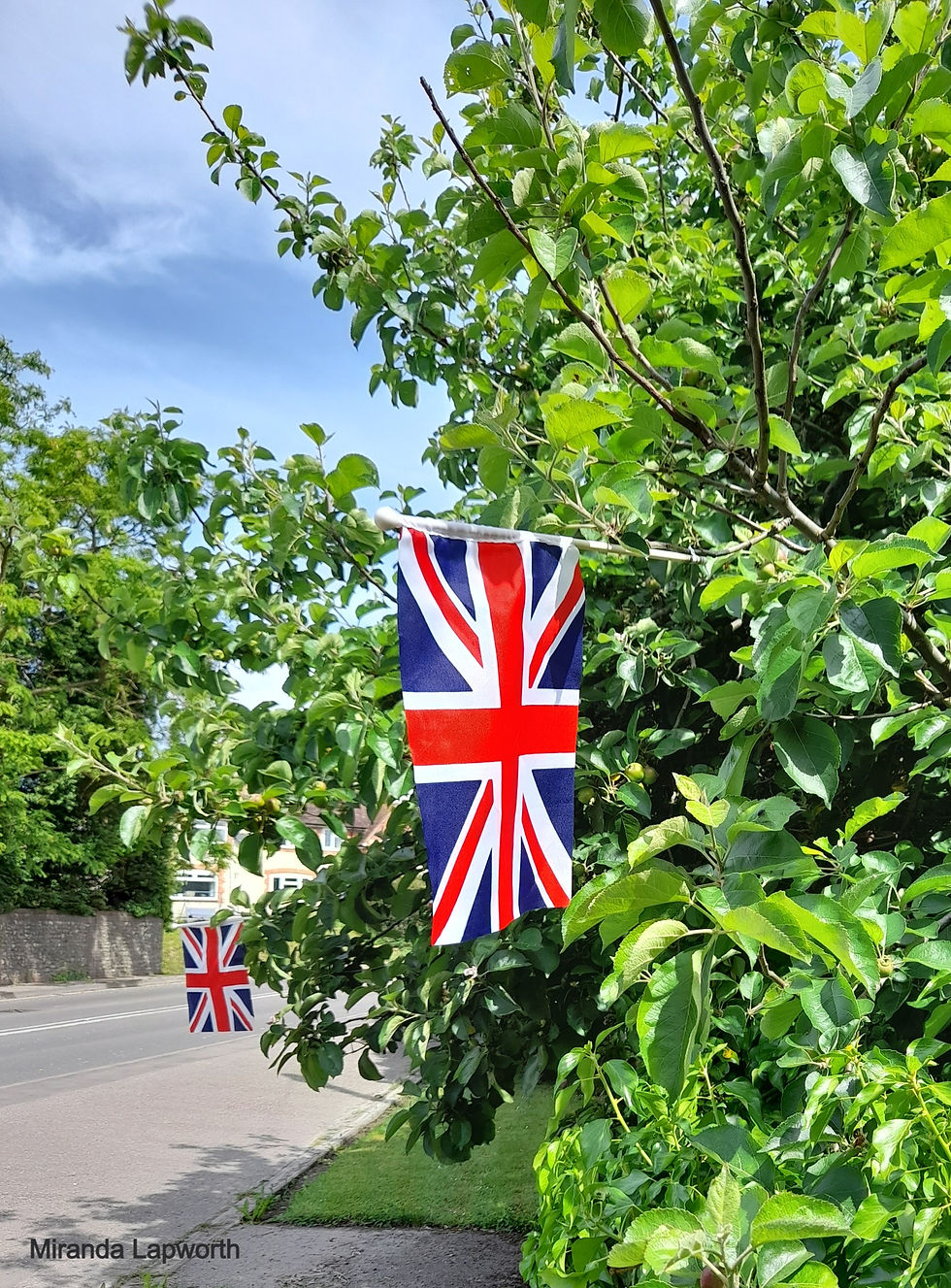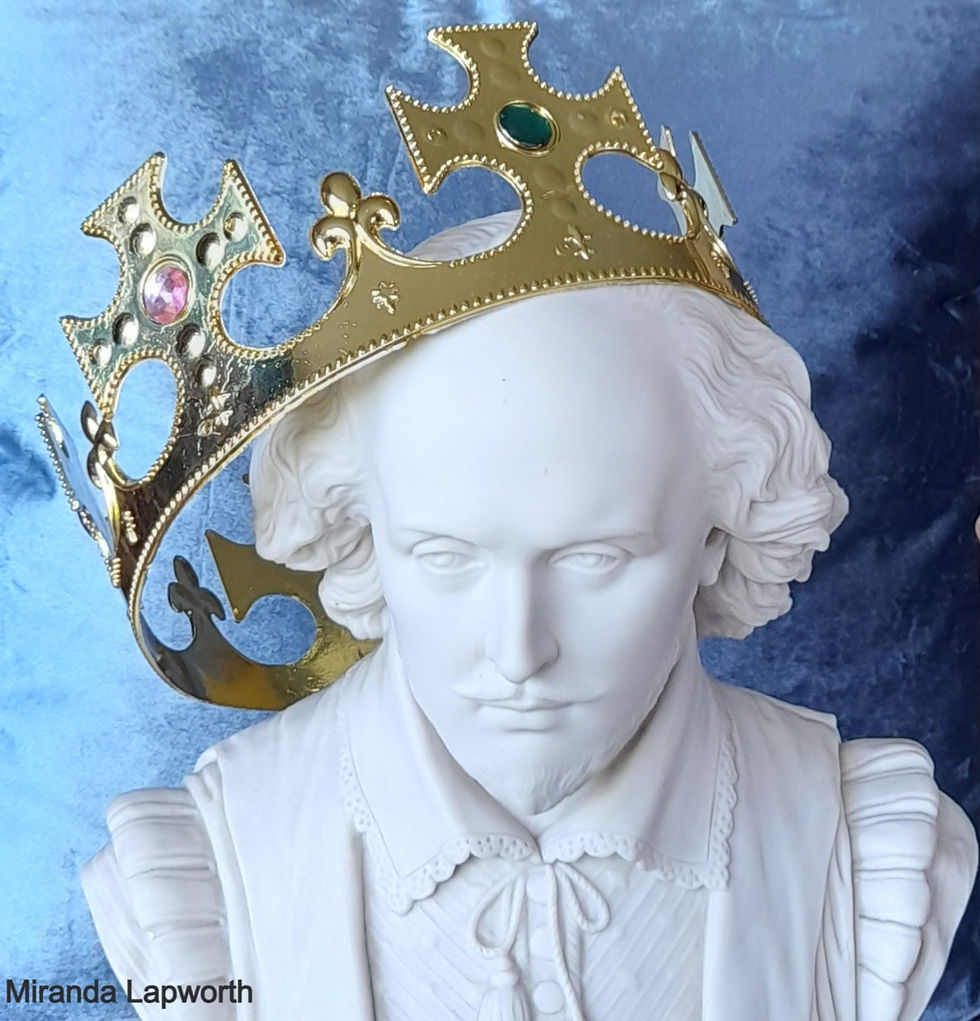This royal throne of kings
- Miranda
- May 5, 2023
- 6 min read

“This royal throne of kings, this sceptred isle…” [RII, 2.1.]
So as we crown a king, let's ponder: how does Charles measure up in Shakespeare's view?
Shakespeare had quite a bit to say about good and bad kings and queens.
Our new king actually played Macbeth whilst at Gordonstoun.

In Macbeth, good and noble King Duncan is slaughtered by Macbeth who then rules as a bloody tyrant - that's a clear contrast of kingship if ever there was one.
Macbeth even hesitates to murder Duncan, describing for us his excellent qualities which, like protesting angels, will cry out at his murder:
“Besides, this Duncan
Hath borne his faculties so meek, hath been
So clear in his great office, that his virtues
Will plead like angels, trumpet-tongued, against
The deep damnation of his taking-off.” [M, 1.7.]
But just in case we need it spelling out, we are given a list of what makes a great king.
Malcolm, son of murdered Duncan, claims that he has none of the ‘kingly’ virtues required to become King of Scotland (this is to test MacDuff, whom he fears might be in league with Macbeth – unlikely since Macbeth just had MacDuff’s wife and children slaughtered) and Malcolm maintains that he’d be a far worse bet than the butchering tyrant Macbeth, for he is lustful, avaricious and has no redeeming features whatsoever. (All nonsense, but he needs to be sure of MacDuff’s loyalty to Scotland – and it works.)
This is Malcolm’s list of “the king-becoming graces":

Justice
Verity
Temp'rance
Stableness
Bounty
Perseverance
Mercy
Lowliness
Devotion
Patience
Courage
Fortitude
So, here’s my question to you: does Charles III fit the bill?
I think we can all agree that he has ‘perseverance’ and ‘patience’ – waiting 70 years to finally do the job you’ve been in training for ticks those two qualities.
But what about the rest?
You tell me!
Comment below or message me how many of the “king-becoming graces” our new King possesses, and therefore how worthy he might be in Shakespeare’s eyes.
Certainly Charles III had a more dignified youth than young Prince Hal in Henry IV.

Henry IV frets and tuts and despairs over his son Prince Hal’s dissolute behaviour, reckoning that the heir to the throne is a waste of space. The King can only
“See riot and dishonour stain the brow
Of my young Harry” [H IV i, 1.1.]
Hal, drinking and carousing with Falstaff and their squad, has quite the reputation of a louche drunk.
But right from the outset Hal confides his strategy to the audience:
“So when this loose behaviour I throw off
And pay the debt I never promised,
By how much better than my word I am,
By so much shall I falsify men’s hopes;
And, like bright metal on a sullen ground,
My reformation, glitt’ring o’er my fault,
Shall show more goodly and attract more eyes
Than that which hath no foil to set it off.” [H IV i, 1.2.]
Charles as a young man might have caused Prince Philip almost equal frustration, however, for his own personality traits that were so different from his father’s. What do you think?
Henry IV lectures Hal on how hard he worked to restore faith and loyalty to the Crown after Richard II’s failings:
“dressed myself in such humility
That I did pluck allegiance from men’s hearts,” [H IV i, 3.2.]
Henry sees the same loss of dignity, rigour and royal integrity in Hal as was in Richard. So degenerate does he consider Hal to be that, despite Hotspur (Harry Percy) being Henry IV’s enemy, the King wishes he were in fact his son and heir, for he shows all the desired qualities of kingship: concern for the state, leadership and honour.
Again, does our new King have these qualities?
Concern for the State
Leadership
Honour
Comment or message and let’s see what we think…
Incidentally, redemption comes spectacularly on the battlefield for Hal when he saves his father and goes on to kill Percy.

He also goes on to be Henry V of course, with Agincourt and “Cry God for Harry, England and St George” and all that victorious stuff, so he proves his doubters wrong.
He even, on the eve of battle, disguises himself and goes amongst his army, listening to them, understanding them and, quietly, putting the case for the King just being a man, as prone to fear and anxiety as anyone:
“I think the King is but a man, as I am. The violet smells to him as it doth to me. The element shows to him as it doth to me. All his senses have but human conditions. His ceremonies laid by, in his nakedness he appears but a man.” [HV, 4.1.]
I can’t quite see Charles III successfully donning a disguise and going out and about to check what folks are thinking, but does he have these virtues of listening, understanding, and sensitive communication?

The dying Henry IV gives one of the truest statements on monarchy:
“Uneasy lies the head that wears a crown.”
[H IV ii, 3.1.]
I don’t think there has been a King or Queen in history who has not found this to be accurate. But it is, I guess, how they manage that unease that is the measure by which we judge them.
The death-bed scene of Henry IV with Hal is when father and son truly make their peace, and the solemn weight and responsibility of the Crown descends on the Prince.
“My gracious liege,
You won it, wore it, kept it, gave it me.
Then plain and right must my possession be,
Which I with more than with a common pain
’Gainst all the world will rightfully maintain.” [HIV ii, 4.3.]

Hal’s vow to renounce his former life and be the honourable, serious and responsible King is a relief to the country, but a moment of heartbreak for Falstaff who is coldly, and publicly, dropped, ignored, cancelled. The cost of a crown is to drop fond but foolish friends.
In another time and place, Brutus is full of misgivings as Julius Caesar’s popularity increases and it seems that he may be crowned, and in his cracking monologue (“It must be by his death…”) Brutus muses on the corrupting nature of power:

“Th’ abuse of greatness is when it disjoins remorse from power.” [JC, 2.1.]
Could Charles III, now he finally takes the Crown, fulfil the fears of a Brutus, that he will lack the ability to assess his own short-comings or feel self-reproach?
And ultimately, when the cameras stop rolling and the door shuts on the paparazzi, the monarch is left with the person they are in their own head and heart.
A human being.
The path to the Crown is rocky and unpredictable. Who does our new king see in the mirror when the doors close?
Shakespeare writes brilliantly of a monarch's personal feelings as Richard II relinquishes the Crown, handing it over to Bolingbroke/Henry IV:
“My crown I am, but still my griefs are mine. You may my glories and my state depose but not my griefs; still am I king of those.” [RII, 4.1.]
Click on this emotional extract from 'The Hollow Crown' with the divine Ben Wishaw giving up the crown to Rory Kinnear. Stunning work.
Our monarchy, it’s true, doesn’t have the power and sway of Shakespeare’s kings and queens (and a good thing too), but the requirement of them to embody certain values, virtues and qualities is important, if the Crown is to survive beyond Netflix.
Our late Queen did not always get it right, the crown was uneasy on her head at times, but her self-sacrifice, duty and “king-becoming graces” were pretty universally acknowledged by the time we said farewell last summer.

So as the crowds start queuing for the best views of the Coronation, let us view our new King through Shakespeare’s eyes and consider whether he embodies what Shakespeare would hope for him, and for us his nation.
I love getting your messages and feedback, whether private or public. Public comments on this blog can be anonymous if you prefer!
Personally, I love that we have a monarchy – we do history and pageantry and tradition better than anyone else and we are the envy of the world for it.
So much in the world is crap right now, let us not destroy one of the remaining things we do so well.
I sincerely hope Charles III does nurture the king-becoming graces within himself, fulfils the expectations of those who love him, and impresses and wins over those with less enthusiasm.
I finish with my own hopes for the new Carolean age.
At the close of Henry VIII, Cranmer delivers a somewhat idealistic view/prophecy of the infant Elizabeth’s future reign - shameless flattery from Shakespeare to his former queen and subsequent king.

I am borrowing from it with a fervent hope: wouldn't it be wonderful if the world bucked up its ideas and that, in these times of hardship and chaos, this Carolean age might just see that
“...every man shall eat in safety
Under his own vine what he plants, and sing
The merry songs of peace to all his neighbours.” [HVIII, 5.4.]
So, over to you.
Charles III and the king-becoming graces...
Justice
Verity
Temp'rance
Stableness
Bounty
Perseverance
Mercy
Lowliness
Devotion
Patience
Courage
Fortitude






Re reading this! Months into King Charles reign and he feels secure. Dependent on his Queen but embracing duty and mingling with the crowd.